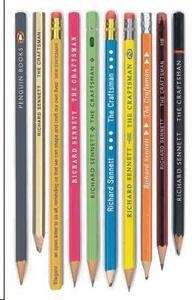The Craftsman

Editorial Penguin UK
Fecha de edición febrero 2009
Idioma inglés
EAN 9780141022093
336 páginas
Libro
encuadernado en tapa blanda
Resumen del libro
This book argues that there is a craftsman in every human being, and is a philosophically-minded enquiry into practical activity of many different kinds past and present. History has drawn fault-lines between practice and theory, technique and expression, craftsman and artist, maker and user; and modern society suffers from this historical inheritance. But the past lives of crafts and craftsmen also suggests ways of using tools, organising bodily movements and thinking about materials which provide viable alternative proposals about how to utilise one's talents.
The book divides into three parts: the first addresses the craftsman at work. This is a story of workshops - the guilds of medieval goldsmiths, the ateliers of musical instrument makers, modern laboratories in which masters and apprentices work together but not as equals. In its second part the book explores the development of skill: knowledge gained in the hand through touch and movement. A diverse group of case studies illustrates the grounding of skill in physical practice from striking a piano key to the use of imperfect scientific instruments like the first telescopes or the anatomist's scalpel. The argument of the third part is that motivation counts for more than talent. Enlightenment thinkers believed that everyone possesses the ability to do good work, and that we are more likely to fail as craftsmen due to our motivation than because of our lack of ability. The book assesses and challenges this belief, concluding by considering craftsmanship as more than a technical practice, and considering the ethical questions that craftsmen's sustaining habits raise about how we anchor ourselves in the world around us.
Biografía del autor
x{0026}lt;p Richard Sennet, sociólogo y profesor de la prestigiosa London School of Economics, es autor de algunos de los ensayos más provocadores e incisivos de nuestro tiempo sobre el trabajo, la familia y las clases sociales, entre los que destaca "La corrosión del carácter", Premio Europa de Sociología, que tuvo una extraordianria acogida internacional.x{0026}lt;/p








